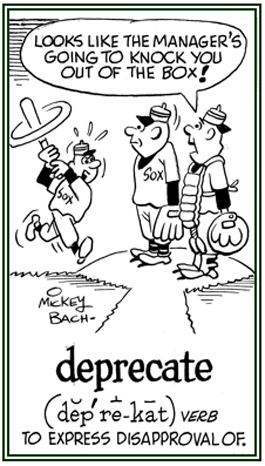de-
(Latin: from, away from, off; down; wholly, entirely, utterly, complete; reverse the action of, undo; the negation or reversal of the notion expressed in the primary or root word)
2. To leave something somewhere for safekeeping: Hans and Gretel deposited their valuables in the hotel safe before they went out for the evening.
3. To pay money into an account in a bank or other financial institution: Darla deposited more cash into her savings account in the month of May than she did in April.
4. To give a sum of money as part-payment or security for something: Mr. and Mrs. Johnson deposited the minimum down payment to guarantee that they would get the car the following week.
5.In nature, to leave or to form a layer of sand, sediment, or other substance, as a gradual process in one place, or be left in this way: Christy and Susan could see the layers of silt deposited by the river.
Each of these terms can correctly be used to refer to a place where something is deposited or left for safekeeping.
A safe deposit box stored in a bank vault is a depository or a depositary.
The term depositary more often refers not to a place for safekeeping, but to a group or even an individual who is entrusted with the preservation of something.
The officers of a bank or the trustees of a museum, for instance, would more likely be depositaries instead of depositories.
2. A process in which layers of a substance have formed gradually over a period of time; especially, matter by a natural process: The cut in the road revealed several depositions of soil that had been laid down over the centuries.
3. Something that has been placed in a safe, secure place; such as, in a safe or in a bank: Helena made sure that the deposition of the company payroll was properly completed.
4. In law, a testimony under oath; especially, a statement by a witness that is written down or recorded for use in a court of law at some later date: The lawyer, Mr. Clint, met with Steven, his client, in the hospital in order to take his deposition for the upcoming court appearance he would attend when he was physically able to do it.
2. That which is bad or morally corrupt: The depravation of Mr. Moore, the politician, was revealed and ended his career as a leading member of his political party.
2. To change for the worse; especially, morally; to corrupt or to pervert: Some talk-show hosts don't seem to realize how they have depraved their words with disgusting and unacceptable vulgarism.
2. Having shown great moral corruption or wickedness: Jack, the killer, had a depraved disregard for human life.
Judge Smith declared that Alice with her depraved behavior would no longer be allowed to have any more contacts with young teenagers.
2. That which is bad or worse: The depravement of the administrators of the newspaper was revealed by Sam, one of its reporters.
2. A morally corrupt or wicked act or acts: Mrs. Jackson was fired because of her depravities with a boy in one of her classes.
The townspeople deprecated the new exhibit at the art museum because it was so negative about religions.
2. To belittle, to deplore: Everett, you should not deprecate your own worth to the community because you have done so much to help homeless people.There are many who deprecate the use of public money for what they consider to be nonessential purposes.
3. Etymology: from Latin de-, "away" + precari "to pray, to request" from which we also get pray and prayer. Originally, it meant "to pray for deliverance from something unfavorable".
Go to this Word A Day Revisited Index
so you can see more of Mickey Bach's cartoons.
Elaine said she didn't mean to deprecate Dudley's accomplishments as an author, but there weren't very many who purchased his book.
2. A prayer meant to avert or to remove some evil or disaster: Adam had deprecations in his nightly prayers to God to help people who were caught in the tornado.2. A reference to the removal or the averting of some evil by means of prayer.
2. A reference to expressing disapproval or criticism.
3. Mildly uncomplimentary; especially, of oneself.


